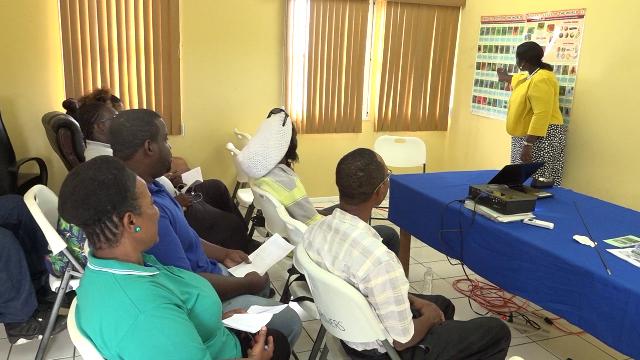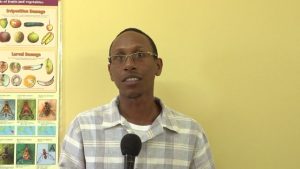Nevis Agriculture Dept. seeking to synchronise fruit fly surveillance programme with St. Kitts

NIA CHARLESTOWN NEVIS (August 17, 2018) — The Quarantine Division in the Department of Agriculture on Nevis is one step closer to synchronising its fruit fly surveillance programme with that of the Department of Agriculture on St. Kitts.
Mr. Quincy Bart, Senior Quarantine Officer for Nevis, told the Department of Information that the one-day Surveillance Workshop on August 14, 2018, targeting the principles and procedures involved in surveillance is just the start of a collaborative effort between the Departments of Agriculture in Nevis and St. Kitts.
“This is just only the first step; the second phase is for implementation. We at the Quarantine Division will try to develop surveillance programmes to ensure that our borders are protected,” he said.

Ms. Jeanelle Kelly, Senior Quarantine Officer in the Department of Agriculture in St. Kitts, who facilitated the workshop with Ms. Shakema Hazel, Quarantine Assistant Officer, noted the importance of surveillance to the agricultural sector on both islands.
“We use it to collect accurate information and record that data so as to help us with certain objectives in the agricultural sector, including to detect the presence of any quarantine pests that we are concerned about in the country.
“Also, we use it to get some information on pest risk analysis. That’s very important and we also use it to determine if there is a pest free area or not,” she said.
Ms. Kelly stated that among the areas discussed at the workshop were detection techniques, insect capture methods, budget presentation, public awareness and fruit fly surveillance.
The senior agriculture officer added that fruit fly surveillance is an area in which both departments plan to expand on Nevis.

“We do have our surveillance programme in St. Kitts at the moment and we want to expand and share and also, get a surveillance programme in Nevis to determine what fruit flies are present, if any, and what mitigation measures we could engage in to try to suppress or eradicate those pests,” she said.
Meantime, Ms. Hazel explained that there are 5,000 fruit fly species in the world, 500 of which are deemed as pests. Among them, the West Indian fruit fly, which is present in St. Kitts.
“The fruit flies we have in St. Kitts attack mainly mangoes and its alternate hosts would be carambola or guava or anything it can feed on once it is in season…In St. Kitts, we have seen over the past few years, the infestation in mangoes has been kind of high compared to this year,” she said.
Ms. Hazel stated that the female fruit fly penetrates the skin of the fruit with its ovipositor and deposits its eggs which turns into lave. The lave feeds on the inside the fruit causing tunnelling damage, which is associated with secondary rotting from micro-organisms.
END
